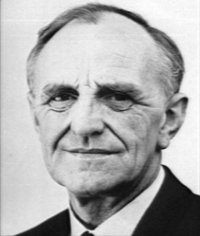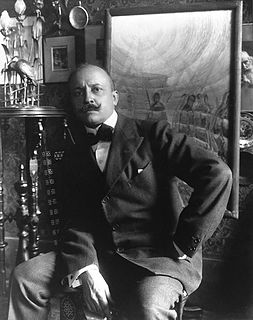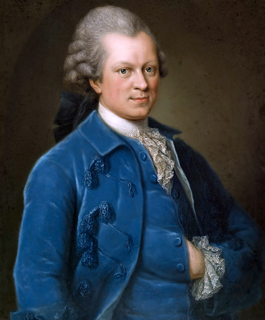A Quote by Denis Diderot
If your little savage were left to himself and be allowed to retain all his ignorance, he would in time join the infant's reasoning to the grown man's passion, he would strangle his father and sleep with his mother.
Related Quotes
What a wee little part of a person's life are his acts and his words! His real life is led in his head, and is known to none but himself. All day long, the mill of his brain is grinding, and his thoughts, not those of other things, are his history. These are his life, and they are not written. Everyday would make a whole book of 80,000 words -- 365 books a year. Biographies are but the clothes and buttons of the man -- the biography of the man himself cannot be written.
When Christ was about to leave the world, He made His will. His soul He committed to His father; His body He bequeathed to Joseph to be decently interred; His clothes fell to the soldiers; His mother He left to the care of John; but what should He leave to His poor disciples that had left all for Him? Silver and gold He had none; but He left them that which was infinitely better, His peace.
What the working man sells is not directly his Labor, but his Laboring Power, the temporary disposal of which he makes over to the capitalist. This is so much the case that I do not know whether by the English Law, but certainly by some Continental Laws, the maximum time is fixed for which a man is allowed to sell his laboring power. If allowed to do so for any indefinite period whatever, slavery would be immediately restored. Such a sale, if it comprised his lifetime, for example, would make him at once the lifelong slave of his employer.
He who is himself crossed in love is able from time to time to master his passion, for he is not the creature but the creator of his own misery; and if a lover is unable to control his passion, he at least knows that he is himself to blame for his sufferings. But he who is loved without reciprocating that love is lost beyond redemption, for it is not in his power to set a limit to that other's passion, to keep it within bounds, and the strongest will is reduced to impotence in the face of another's desire.
When a man sought knowledge, it would not be long before it could be seen in his humbleness, his sight, upon his tongue and his hands, in his prayer, in his speech and in his disinterest (zuhd) in worldly allurements. And a man would acquire a portion of knowledge and put it into practice, and it would be better for him than the world and all it contains - if he owned it he would give it in exchange for the hereafter.
The mother gazes at the baby in her arms, and the baby gazes at his mother's face and finds himself therein... provided that the mother is really looking at the unique, small, helpless being and not projecting her own expectations, fears, and plans for the child. In that case, the child would find not himself in his mother's face, but rather the mother's own projections. This child would remain without a mirror, and for the rest of his life would be seeking this mirror in vain.
contrary to what many believed, my father was kind and tenderhearted, especially towards his family. His forbidding sternness seemed to melt into love, kindness, and easy familiarity when he was with us. Especially with me, his acknowledged successor to the throne, he would play lightheartedly. When we were alone together, he would sing me little songs; I don't remember his ever doing this in front of others, but when only the two of us were there, he would often sing to me.
When will you disembarrass yourselves of the lymphatic ideology of that deplorable Ruskin, which I would like to cover with so much ridicule that you would never forget it? With his morbid dream of primitive and rustic life, with his nostalgia for Homeric cheeses and legendary wool-spinners, with his hatred for the machine, steam power, and electricity, that maniac of antique simplicity is like a man who, after having reached full physical maturity, still wants to sleep in his cradle and feed himself at the breast of his decrepit old nurse in order to recover his thoughtless infancy.
In every Magical, or similar system, it is invariably the first condition which the Aspirant must fulfill: he must once and for all and for ever put his family outside his magical circle.Even the Gospels insist clearly and weightily on this.Christ himself (i.e. whoever is meant by this name in this passage) callously disowns his mother and his brethren (Luke VIII, 19). And he repeatedly makes discipleship contingent on the total renunciation of all family ties. He would not even allow a man to attend his father's funeral!Is the magical tradition less rigid?Not on your life!
Anyone who has read Yeats's wonderful Autobiography will remember his Sligo shabby, shadowed, half country and half sea, full of confused romance, superstition, poverty, eccentricity, unrecognized anachronism, passion and ignorance and the little boy's misery. Yeats was treated well but was bitterly unhappy; he prayed that he would die, and used often to say to himself: "When you are grown up, never talk as grown-up people do of the happiness of childhood.
The true value of man is not determined by his possession, supposed or real, of Truth, but rather by his sincere exertion to get to the Truth. It is not possession of Truth by which he extends his powers and in which his ever-growing perfectability is to be found. Possession makes one passive, indolent and proud. If God were to hold all Truth concealed in his right hand, and in his left only the steady and diligent drive for Truth, albeit with the proviso that I would always and forever err in the process, and to offer me the choice, I would with all humility take the left hand.



































